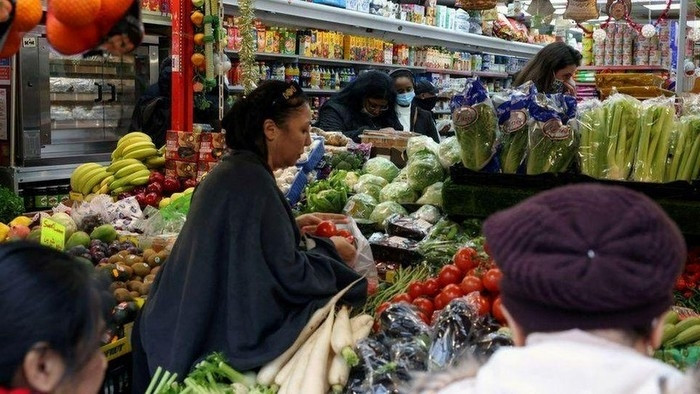The BoE’s efforts came in the context that an "inflation storm" is sweeping through the "country of fog”, causing many worrying economic consequences.
According to official figures recently announced by the UK Office for National Statistics (ONS), the UK’s annual inflation hit a new 40-year high, severely affecting workers' wages and forcing the BoE to raise interest rates. The inflation in the UK rose from 9% in April to 9.1% in May, the highest level since 1982. The BoE forecasted inflation to exceed 11% by the end of the year.
The ONS Chief Economist, Grant Fitzner, said the rise in the UK’s inflation was caused by the rising food prices and the record levels of gasoline prices. The highest inflation in many decades has been leading to a cost-of-living crisis, resulting in many consequences for the UK.
Accordingly, consumers are feeling the sharpest squeeze in living standards in at least two decades and are calling for aid from the government. In recent weeks, British railway workers have gone on the biggest strike in 30 years as soaring prices hit their wages. Meanwhile, lawyers in England and Wales have recently backed the strike, while teachers and staff of the National Health Service and the post offices have also followed suit.
Inflation has also pushed UK economic growth into a slump since March this year. According to official figures announced by the ONS, the UK’s gross domestic product fell 0.3% in April after falling 0.1% in March. The country’s output in services, manufacturing and construction also fell. The above data has raised concerns that the UK economy may fall into a recession. Meanwhile, the ONS noted that industries continue to record the negative effects of inflation and supply chain disruptions.
The escalating inflation has forced the BoE to raise its key interest rate five times since December 2021.
According to the latest announcement, the BoE will accelerate action against inflation next week when the bank and about 70 other financial institutions globally, raise interest rates by 50 basis points.
Analysts said that this move will mark the UK's biggest interest rate hike in 27 years while contributing to creating a "historic turning point" to take the UK’s economy out of the era of cheap money.
Even so, the BoE’s Governor Andrew Bailey told reporters that this interest rate hike would not be the last. He affirmed that policymakers are ready to act more aggressively if necessary to curb inflation. According to analysts, the BoE is one of the first central banks of a major economy to decide to raise interest rates following the COVID-19 pandemic outbreaks. However, the bank also has a very long way to keep up with the US Federal Reserve (FED) which raised interest rates by 75 basis points for the second time in a row. The BoE interest rate is currently 1.25%, but the FED’s rate is 2.5%.
The BoE has always stressed its determination to control inflation by “interest rate tool”. In its statement in June, the agency affirmed: “The scale, pace and timing of any further increases in Bank Rate will reflect the Monetary Policy Committee (MPC)’s assessment of the economic outlook and inflationary pressures. The Committee will be particularly alert to indications of more persistent inflationary pressures, and will, if necessary, act forcefully in response”.
Most members of the BoE's MPC believed that some degree of further tightening in monetary policy may still be appropriate in the coming months. However, some critics said that the BoE is moving too slowly to prevent inflation, damaging the economy over the long term.
Another problem for the UK is that the BoE's upcoming interest rate hike will put more pressure on the UK's prime ministerial candidates. British Foreign Secretary Liz Truss has pledged to cut taxes if she wins the race to lead the ruling Conservative Party. Meanwhile, former British Finance Minister Rishi Sunak, who is also a rival of Liz Truss, warned that this would fuel inflation, forcing interest rates to rise even higher.
















